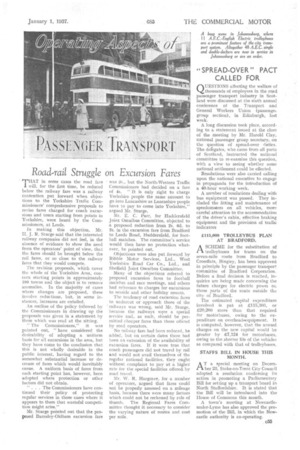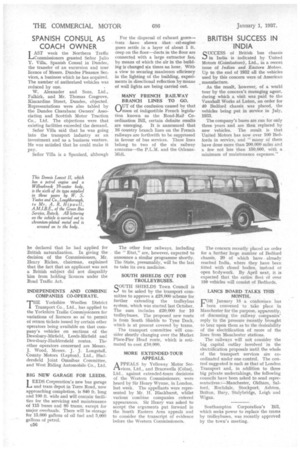Road-rail Struggle on Excursion Fares
Page 105

Page 106

If you've noticed an error in this article please click here to report it so we can fix it.
THAT in some cases the road fare .I, will, for the first time, be reduced below the railway fare was a railway contention put forward when objections to the Yorkshire Traffic Commissioners' comprehensive proposals to revise fares charged for coach 'excursions and tours starting from points in Yorkshire, were heard by the Commissioners, at Leeds.
In making this objection, Mr. H. J. R. Sturge said that the interested railway companies did not feel, in the absence of evidence to show the need from the operators' point of view, that the fares should be brought below the rail .fares, or so close to the railway fares that they would compete.
The revision proposals, which cover the whole of the Yorkshire Area, concern starting points in approximately 100 towns and the object is to remove anomalies. In the majority of cases where changes are proposed, these involve reductions, but, in some instances, increases are entailed.
An outline of the policy followed by the Commissioners in drawing up the proposals was given in a statement by them which was read at the sitting.
" The Commissioners," it was pointed out, " have considered the desirability of adopting a uniform basis for all excursions in the area, but they have come to the conclusion that this is not wholly desirable in the public interest, having regard to the somewhat substantial increase or decrease of fares which would inevitably ensue. A uniform basis of fares from each starting point has, however, been adopted where protection or other factors did not obtain.
" . . . The Commissioners have continued their policy of protecting regular services in those cases where it appears to them that wasteful competition might arise."
Mr. Sturge pointed out that the proposed Barnsley-Oldham excursion fare was 3s., but the North-Western Traffic Commissioners had decided on a fare of 4s. " It is only right to charge Yorkshire people the same amount to go into Lancashire as Lancashire people have to pay to come into Yorkshire," argued Mr. Sturge.
Mr. E. C: Parr, for Huddersfield Joint Omnibus Committee, objected to a proposed reduction from 2s. Gd. to 2s. in the excursion fare from Bradford to Leeds Road, Huddersfield, for football matches. The committee's service would then have no protection whatever, he pointed out.
Objections were also put forward by Ribble Motor Services, Ltd., West Yorkshire Road Car Co., Ltd., and Sheffield Joint Omnibus Committee.
Many of the objections referred to proposed excursion fares to football matches and race meetings, and others had reference to charges for excursions to seaside and other holiday resorts.
The tendency of road excursion fares to undercut or approach those of the ' railways was wrong, said Mr. Sturge, because the railways were a special service and, as such, should be permitted cheaper fares than those offered by road operators.
No railway fare had been reduced, be added, but on certain dates there had been an extension of the availability of excursion fares. If it were true that coach passengers did not travel by rail and would not avail themselves of the regular national facilities, they ought without complaint to pay at a higher rate for the special facilities offered, by road travel.
Mr. W. R. Hargrave, for a number of operators, argued that fares could not be properly assessed on a mileage basis, because there were many factors which could not be reckoned by rule of thumb. The Regional Fares Committee thought it necessary to consider the varying nature of routes and cost per mile,
"SPREAD-OVER" PACT CALLED FOR
QESTIONS affecting the welfare of thousands of employees in the mad passenger transport industry in Scotland were discussed at the sixth annual conference of the Transport and General Workers Union (passenget group section), in Edinburgh, last week.
A long discussion took place, according to a statement issued at the close of the meeting by Mr. Harold Clay, national passenger group secretary, on the question of spread-over duties. The derogates, who came from all parts of Scotland, instructed the national committee to re-examine this question, with a view to seeing whether some national settlement could be effected.
Resolutions were also carried calling upon the national executive to engage in propaganda for the introduction of a 40-hour working week.
A number of resolutions dealing with bus equipment was paased. They included the fitting and maintenance of speedometers on all vehicles, more careful attention to the accommodation of the driver's cabin, effective braking equipment and the provision of traffic indicators
£115990 TROLLEYBUS PLAN AT BRADFORD.
A SCHEME for the substitution of
trolleybuses for trams on the seven-mile route from Bradford to Crossfiats, Bingley, has been approved in principle by the passenger transport committee of Bradford Corporation. Before a final decision is reached, inquiries are being made concerniug the future charges for electric powei on those parts of the route outside the city of Bradford, The estimated capital expenditure involved is put at £115,303, or £20,200 more than that required for motorbuses, owing to the expenditure on overheadoequipment. It is computed, however, that the annual charges on the new capital would be greater by £1,124 for motorbuses, owing to the shorter life of the vehicle:s as compared with that of trolleybuses.
STAFFS BILL IN HOUSE THIS MONTH.
ATa 'Pedal meeting on December 23, Stoke-on-Trent City Council adopted a resolution confirming its action in promoting a Parliamentary Bill for setting up a transport board in North Staffordshire. It is stated that the Bill will be introduced into the House of Commons this month.
A town's meeting at Newcastleunder-Lyme has also approved the promotion of the Bill, in which the Newcastle authority is co-operating.
SPANISH CONSUL AS COACH OWNER
I AST week the Northern Traffic ..LaCommissioners granted Senor Julio Y. Villa, Spanish Consul in Dundee, the transfer of an excursion and tour licence of Messrs. Dundee Pleasure Services, a business which he has acquired. The number of authorized vehicles was
reduced by one. • W. Alexander and Sons, Ltd., Falkirk, and Mr. Thomas Cosgrove, Kincardine Street, Dundee. objected. Representations were also tabled by the Dundee Charabanc Owners' Association and Scottish Motor Traction Co., Ltd. The objections were that existing facilities exceeded the demand, Seitor Villa said that he was going into the transport industry as an investment and as a business venture. He was satisfied that he could make it pay.
Sefier Villa is a Spaniard, although he declared that he had applied for British naturalization. In giving the decision of the Commissioners, Mr. Henry Riches, chairman, explained that the fact that an applicant was not a British subject did not disqualify him from holding licences under the Road Traffic Act.
INDEPENDENTS AND COMBINE COMPANIES CO-OPE RATE.
THE Yorkshire Woollen District Transport Co., Ltd., has applied to the Yorkshire Traffic Commissioners for variations of licences 50 as to permit of return tickets issued by certain other operators being available on that company's vehicles on sections of the Dewsbury-lVfirfidd, Leeds-Mirfield and Dewsbury-Huddersfield routes. The other operators concerned are Messrs. J. Wood, Messrs. J. J. Longstaff, County. Motors (Lepton), Ltd., Huddersfield Joint Omnibus Committee, and West Riding Automobile Co., Ltd,
BIG NEW GARAGE FOR LEEDS. LEEDS Corporation's new bus garage
LEEDS tram depot in Torre Road, now approaching completion, is 840 ft, long and 100 ft. wide and will contain facilities for the servicing and maintenance of 115 buses and 80 trams, except for major overhauls. There will be storage for 15,000 gallons of oil fuel and 5,000 gallons of petrol.
c56
For the dispersal of exhaust gases— testshave shown that oil-engine gases settle in a layer of about 1 ft. deep on the floor—ducts in the floor are connected with a large extractor fan, by means of which the air in the building is changed six times an hour. With a view to securing maximum efficiency in the lighting of the building, experiments in directional reflection by means of wall lights are being carried out.
MANY FRENCH RAILWAY
BRANCH LINES TO GO. rAUT of the confusion-caused by that kJ mass of indigestible French legislation known as the Road-Rail Coordination Bill, certain definite results are emerging. It is announced that 16 country branch lines on the French railways are forthwith to be suppressed in favour of bus services. These lines belong to two of the six railway concerns—the P.L.M. and the OrleansMidi.
The other four railways, including the " Etat," are, however, expected to announce a similar programme shortly. The State, presumably, will be the last to take its own medicine.
SOUTH SHIELDS OUT FOR TROLLEYBLTSES.
SOUTH SHIELDS Town Council is to be asked by the transport committee to approve a £28,000 scheme for further extending the trolleybus system, which was started last October. The sum includes £20,000 for 10 trolleybuses. The proposed new route is from South Shields to Tyne Dock, which is at present covered by trams.
The transport committee will consider shortly changing over the Market Place-Pier Head route, which is estimated to cost £10,000.
MORE EXTENDED-TOUR APPEALS.
A PPEALS by Yelloway Motor Seri–II/ices, Ltd., and Bracewells {Caine), Ltd., against extended-tours decisions of the Western Commissioners, were heard by Sir Henry Wynne, in London, last week. The appellants were represented by Mr. EL BIackhurst, whilst various combine companies entered appearances. Sir Henry was asked to accept the arguments put forward in the South Eastern Area appeals and to consider the transcript of evidence before the Western Commissioners.
BRITISH SUCCESS IN INDIA
SUCCESS of British bus chassis in India is indicated by United Motors (Caimhatore), Ltd., in a recent issue of Indian and Eastern Motors. Up to the end of 1932 all the vehicles used by this concern were of American manufacture.
As the result, however, of a world tour by the concern's managing agent, during which a visit was paid to the Vauxhall Works at Luton, an order for 40 Bedford chassis, was placed. the vehicles being put in service in July, 1933.
The company's buses are run for only three years and are then replaced by new vehicles. The result is that United Motors has now over 100 Bedfords in service, and " many of them have done more than 200.006 miles and a few not less than 150,000, with a minimum of maintenance expenses."
The concern recently placed an order for a further large number of Bedford chassis, 20 of which have already reached India, where they have been fitted with closed bodies, instead of open bedywork. By April next, it is expected that the entire fleet of over 150 vehicles will consist of Becifords.
LANCS BOARD TALKS THIS MONTH.
FORJanuary 18 a conference has been convened to take place in Manchester for the purpose, apparently, of discussing the railway companies' reply to the pressure recently brought to bear upon them as to the desirability of the electrification of more of the lines from Manchester stations.
The railways will not consider the big capital outlay involved in the electrification proposals until the whole of the transport services are coordinated under one control. The control suggested is such as that of London Transport and, in addition to three big private undertakings, the following councils have been asked to send representatives :—Manchester, Oldham, Salford, Rochdale, Stockport, Ashton, Bolton, Bury, Stalybridge, Leigh and Wigan.
Southampton Corporation's Bill, which seeks power to replace the trams by trolleybuses, was recently approved by the town's meeting.




























































































































































